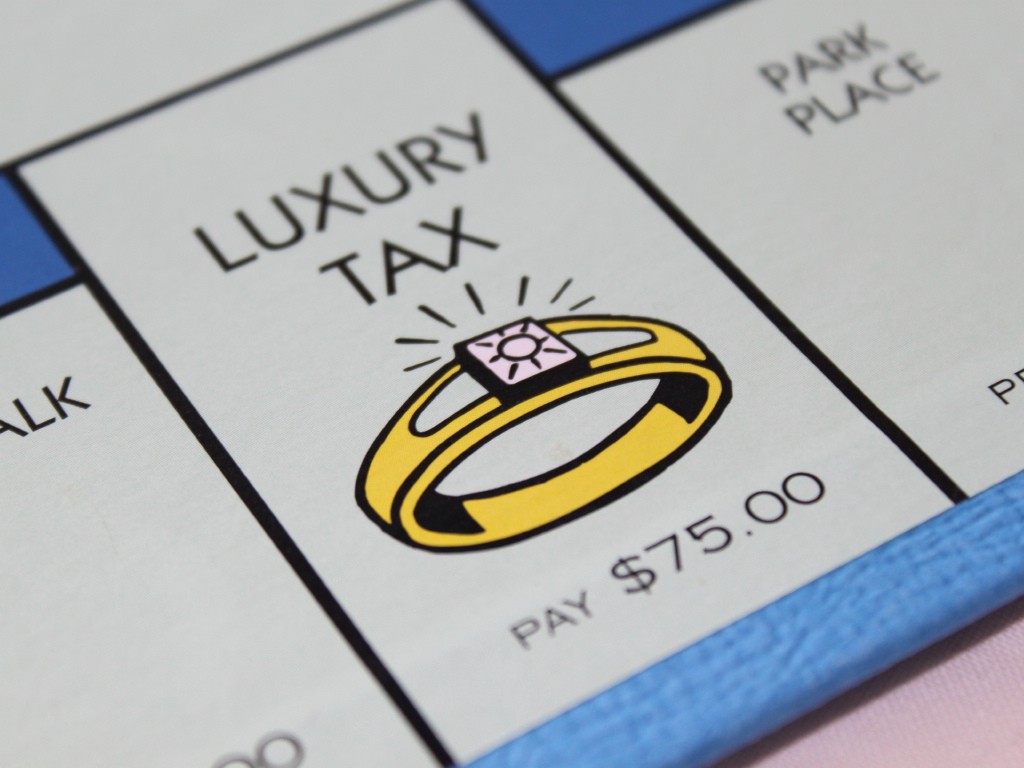Craft
The Writer’s Wallet: The Tax Season of Your Discontent
Procrastinate all you want, but the April 18 tax deadline isn’t one you can miss

The Writer’s Wallet is a new Electric Literature series focusing on writing, money, and the often long-distance relationship between the two. This month, we’re looking at how to pay taxes on your freelance writing income, and next month we’ll probably look at ways to make the process easier for next year — even if we know we’ll give up after a few weeks. The author is in no way a financial advisor or expert, but he is trying to boost his financial literacy without using words like “adulting.”
If you have questions about money and the writing life, tweet them at @benasam, and he’ll try to get you a real answer in an upcoming column. If you live near NYC, come to Electric Literature’s The Writer’s Wallet panel at The Center for Fiction with Tracy O’Neill, Jennifer Baker, Amanda Clayman, Benjamin Samuel.
Although there’s some debate about who said it first (Benjamin Franklin, Daniel Defoe, Christopher Bullock, or Mark Twain), the fact remains that there’s nothing certain in life other than death and taxes — except, as far as I’m concerned, the commitment to avoiding both. I don’t think I’m alone in the feeling that I’d rather die than deal with tax forms. Every year, I tell myself that I’ll get ahead on my taxes, that I’ll be prepared, that I should just get it over with. As tax season approaches, I’ll lull myself to sleep murmuring “tomorrow, tomorrow, tomorrow,” only to awaken in a panic come April, wondering why I’ve put myself in this position again.
As a freelance writer (with a full-time job) and devout procrastinator, identities which feel inextricably linked, paying taxes is particularly overwhelming and dreadful. I don’t understand what I owe, why I owe it, or even how to find out, so I’d rather just avoid it all together. But this year was different. That’s right. Sound the trumpets, start the parade, and don’t forget to send that taxman over with a briefcase bursting with confetti, because I’ve filed my taxes and it’s not even April yet.
What helped me find the motivation was the reassurance that I wasn’t the only one struggling with the process, and I owe that to Amy Smith, Co-Founder and Co-Director of the Headlong Dance Theater company and patron saint of tax-fearing writers. I first heard of Smith when the New York Times visited her workshop for the Whiting Awards, where she helped winners of the $50,000 prize prepare for the financial realities of their good fortune (which, in part, meant learning about the taxes they’d owe). Smith considers herself an artist first and a financial teacher and tax preparer second. In other words, she understands both artists and the IRS, and she’s on our side. “It’s become my personal mission to help other artists with their financial literacy,” Smith told me during a recent phone call.
Smith and I spoke as the desolate tempest of tax season loomed, the horizon darkened by a cloud of W-2s and 1099s. While Smith didn’t help me file my taxes, she was a beacon that assured me I could get through tax season without getting lost. What follows is Smith’s insight for writers hoping to get past taxes and back to their real work.
Here’s what you can still do before April 18:
1) Choose your weapon:
Using a professional tax preparer or software will come at a cost, but it could save you money and time in the long-run. As Smith sees it, the time you’re spending on your taxes is time you could have invested in your writing — or, if you’re like me, making excuses about why you’re not writing.
Last year, about two weeks before taxes were due, I handed over a stack of papers that included my financial records and recent employment history to a harried tax-preparer in downtown Manhattan. “Good luck!” I told him. “Please don’t steal my identity.” When I returned about a week later, he told me what my return would be, and I gave him a check for $85. It was fine, I guess, but I never really felt I had an opportunity to learn or challenge anything.
While I am curious to learn more about the taxes I pay and the deductions I’m taking, I’m not ready to fill out a tax form solo. If there’s anything more daunting than the blank page, it’s the 1040. So this year I used TurboTax for the first time, which Smith recommended for its reputation and customer service. Surprisingly, using software was more expensive ($135 because, in addition to the 1040 for my full time job, I was filing Schedule C for my self-employed income that came from freelance writing), but I did feel more in control of what was happening. And I did call customer service. Repeatedly. And no one made fun of me for my ridiculous, paranoid, and esoteric questions.
If TurboTax isn’t the system you want to use, there are plenty of other alternatives. And there may even be free resources in your community to help you pay your taxes. Check with your local public library, or take a look at this list for other options. However, some free tax prep services won’t assist with Schedule C, which is what you’d use to file your self-employed income from freelance writing. If you’re going solo and paying your taxes with little more than a calculator and a sheaf of papers, godspeed and good luck. (Also, if you know how to do that, maybe you should be writing this instead.)
2) Deduct everything you can
Forget about what your step-dad thinks about your poetry: writing is work. (We can get into why writers need to be paid for their work another time.) And as with any work, that means you’ll have income and expenses. Expenses are where those helpful tax deductions come in. Your expenses lower your net income, which means you’ll owe less to the IRS.
So what’s a deductible expense? According to Smith, deductible expenses are ones that are ordinary and necessary to your work. In other words, “If it’s something you bought because you’re a writer, it’s deductible.” Some of the tools you require as a writer may serve double-duty, like a computer, cellphone, or internet bills. “Those are necessary to your work,” Smith said. “So even if you would have bought them if you weren’t a writer, it’s still totally or partially deductible on your tax return.” Another big one to consider is rent. If you do the majority of your writing at home, and have a dedicated place for your writing, you’ve got a home office and you can deduct that percentage of rent from your taxes. (The same applies if you rent office space for your writing.) “It’s really fine to do that, and it’s appropriate to do that because it’s ordinary in your line of work to have a desk that you write at and necessary to your work to have a desk to write at,” said Smith. To me, that sounds like a good reason to get a bigger, more deductible desk.
Now, here’s a quick look at how deductions can lower your income and, as a result, the amount you’ll owe in taxes. Let’s say you’re working on a novel, but you support yourself through a full-time job and some freelance writing. In addition to tax liabilities from your day job, you’ll have to file Schedule C to pay taxes on your freelance writing, which brought in $5,000. First of all, congratulations! Now let’s look at your expenses:
Supplies (paper, pens, and a new laptop) = $1,500
Research/books/meetings at coffee shops = $50
Rent for your home office = $2,400*
Utilities = $120*
Total expenses = $4,070
Your net income from writing is then $930, and you’d only owe taxes on that, not the full $5,000.
*We’re assuming your home office, where you do the majority of your writing, is a 10×10 ft space in your 500 sq ft apartment, where your total rent is $1000/month and you pay $50/month for the internet. That means your office is 20% of your apartment, so you can deduct $200/month in rent and $10/month in utilities. Also, these numbers are simplified, so please don’t complain about what real rent costs are in your neighborhood.
THE WRITING LIFE: Writing and Mental Health
3) Be prepared to pay, but don’t be afraid to lose
I’ve ended many, many tax seasons wondering how I could owe any money to the government when I made so little. It was frustrating, and it hurt, both emotionally and financially. How would I recover from that unexpected expense? How did I get surprised by this again? If you’ve also been surprised by how much you owe on even the humblest freelance income, you’re in good company. Even if your income is low enough to qualify for the Earned Income Tax Credit, which, according to Smith, many artists are, “you still might owe a little bit because of that [15.2%] self employment tax on Schedule C.” Again, that self employment tax is in addition to whatever taxes you owe on your 1040, if you have a full-time job.
It might feel unfair to pay taxes on the money you’ve hustled to make when you’re still barely getting by, but there’s a reason for it, and it might make that blow a little more bearable. Those taxes you’re paying on your freelance work are there “because you have not been paying into Social Security and Medicare the way you would be if you had a W-2 job,” said Smith. If you had a full-time job with a W-2, that 15.2% would be split between you and your employer. Since you’re your own boss, you have to pay it on your own. If that isn’t exactly a consolation, it might at least clarify what you’re actually paying for. “In a way,” Smith said, “knowing that, helped me feel a little bit better about it.”
Most likely, you’re going to owe taxes on your freelance income. Unless, that is, your expenses exceed your income, in which case you’d be filing a loss. Since writing is work, when you’re freelancing you’re actually running a business, and sometimes even businesses don’t make a profit. “It’s normal for business to have expenses before they have significant income,” Smith said. “That’s called being a startup.” But don’t take that as incentive to take a dive, only deduct your actual ordinary and necessary expenses. And you might want to get some help before you make that filing. “If you have very minimal income and significant expenses, you might want to check in with someone before filing,” said Smith. “But it’s normal and appropriate to have a loss on Schedule C.”
Writers may be masters of language, but most of us are not what Tom Wolfe called “Masters of the Universe.” And, like any other group of professionals, writers have different experiences with money — we may earn less or more than our peers, we may have debts or dependents, we may be financially savvy or financially illiterate — but we all have to pay taxes in the end.
If you’re a writer with questions about finances, tax-related or otherwise, tweet them to @benasam, and he’ll try to find an answer for an upcoming column.









